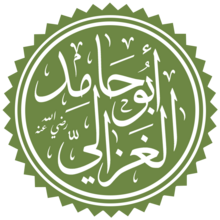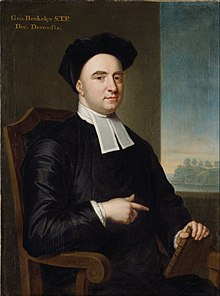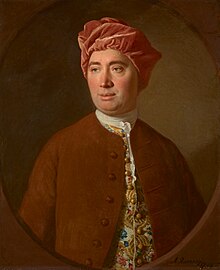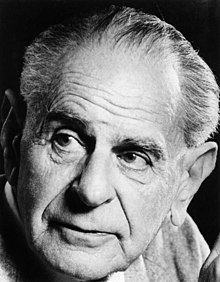
Epistemologists
Epistemology ( (listen); from Ancient Greek ἐπιστήμη (epistḗmē) 'knowledge', and -logy), or the theory of knowledge, is the branch of philosophy concerned with knowledge. Epistemology is considered a major subfield of philosophy, along with other major subfields such as ethics, logic, and metaphysics.Epistemologists study the nature, origin, and scope of knowledge, epistemic justification, the rationality of belief, and various related issues.
13 episodes
Episodes in this category also belong to the following categories:
Al-Ghazali
Melvyn Bragg and his guests discuss the Islamic scholar Al-Ghazali, one of the most significant and influential philosophers of the Middle Ages.
19 March 2015
Featuring: Peter Adamson, Carole Hillenbrand, Robert Gleave
Al-Kindi
Melvyn Bragg and his guests discuss the life and work of Al-Kindi, often described as the first philosopher in the Arabic tradition.
28 June 2012
Featuring: Hugh Kennedy, James Montgomery, Amira Bennison
PhilosophyEpistemologistsPhilosophers of logicAristotelian philosophersArabic-language commentators on AristotleAlchemists of the medieval Islamic worldIslamic philosophersPhilosophers of educationPhilosophers of psychologyPhilosophers of art9th-century philosophersPhilosophers of mathematicsIntellectual historyOntologistsMetaphysiciansPhilosophers of religionAstronomers of the medieval Islamic worldPhilosophers of scienceMusic theorists of the medieval Islamic worldMetaphysics writersAverroes
Melvyn Bragg discusses the philosopher Averroes who worked to reconcile the theology of Islam with the rationality of Aristotle, achieving both fame and infamy.
5 October 2006
Featuring: Amira Bennison, Peter Adamson, Anthony Kenny
PhilosophyEpistemologistsCritics of atheismPhilosophers of literaturePhilosophers of logicLogiciansSocial philosophersAristotelian philosophersArabic-language commentators on AristotleCritics of deismPhilosophers of culturePhilosophers of languageIslamic philosophersPhilosophers of psychologyPhilosophers from al-AndalusOntologistsPhilosophers of mindPolitical philosophersPhilosophers of religionPeople from Córdoba, Spain12th-century Muslim theologiansPhilosophers of sciencePhilosophers of historyCritics of ChristianityAvicenna
Melvyn Bragg and guests discuss Avicenna, among the most important philosophers in the history of Islam.
8 November 2007
Featuring: Peter Adamson, Amira Bennison, Nader El-Bizri
PhilosophyPhilosophers of logicEpistemologistsLogiciansCourt physiciansCritics of atheismIslamic philosophersPhilosophers of religionPhilosophers of psychologyIranian ethicists, Iranian logiciansPhilosophers of mathematicsPhilosophers of scienceAristotelian philosophersMusic theorists of the medieval Islamic worldAlchemists of the medieval Islamic worldMedieval Iranian pharmacologists, Transoxanian Islamic scholarsOntologistsPhilosophers of mindClassical humanistsBishop Berkeley
Melvyn Bragg and his guests discuss the philosopher George Berkeley, one of the most significant thinkers of the 18th century.
20 March 2014
Featuring: Peter Millican, Tom Stoneham, Michela Massimi
PhilosophyEpistemologistsIdealistsAnglican philosophersPeople educated at Kilkenny CollegeAcademics of Trinity College Dublin18th-century Irish writersEnlightenment philosophers17th-century Anglo-Irish people17th-century Anglican theologiansScholars of Trinity College DublinAlumni of Trinity College DublinPhilosophers of science18th-century Anglo-Irish people, 18th-century Irish male writers18th-century Irish philosophersEmpiricistsHistory of calculus18th-century Anglican theologiansDavid Hume
Melvyn Bragg and his guests discuss the work of David Hume, the philosopher and leading figure of the Scottish Enlightenment.
6 October 2011
Featuring: Peter Millican, Helen Beebee, James Harris
PhilosophyCriticism of rationalismEpistemologistsAction theorists18th-century British essayistsMetaphilosophersSkeptic philosophersPhilosophers of social scienceTheorists on Western civilizationPhilosophers of logicSecular humanistsSocial philosophersPhilosophy writersPhilosophers of economicsWriters about religion and sciencePhilosophers of identityBritish philosophers of educationVirtue ethicistsBritish male non-fiction writers18th-century British philosophersPhilosophers of psychologyPhilosophers of artCritics of the Catholic ChurchBritish critics of religionsPhilosophers of mathematicsAlumni of the University of EdinburghConservatismEmpiricistsOntologistsPhilosophers of mindDeist philosophersPeople of the Scottish EnlightenmentPhilosophers of religionFreethought writersBritish consciousness researchers and theoristsEnlightenment philosophersWriters about activism and social changePhilosophers of sciencePhilosophers of historyBritish male essayistsHobbes
Melvyn Bragg discusses Thomas Hobbes, the great 17th century philosopher who famously said that ungoverned man lived a life that was ‘solitary, poor, brutish and short’.
1 December 2005
Featuring: Quentin Skinner, David Wootton, Annabel Brett
PhilosophyEpistemologistsMaterialistsNatural law ethicistsAlumni of St John's College, Cambridge17th-century English philosophersTheorists on Western civilizationEnglish physicistsPhilosophers of lawSocial philosophersBritish philosophers of educationRhetoric theoristsBritish critics of ChristianityPhilosophers of culturePhilosophers of language17th-century writers in LatinBritish critics of religionsCritics of the Catholic Church17th-century English writersPolitical realistsPhilosophers of mathematicsEnglish theologiansEmpiricistsOntologistsPhilosophers of mindMetaphysiciansPhilosophers of religionThomas HobbesEnglish political philosophersPhilosophers of sciencePhilosophers of history17th-century English male writersKierkegaard
Melvyn Bragg and guests discuss the rich and radical ideas of Soren Kierkegaard, often called the father of Existentialism.
20 March 2008
Featuring: Jonathan Rée, Clare Carlisle, John Lippitt
PhilosophyEpistemologists19th-century essayistsChristian humanistsUniversity of Copenhagen alumniMetaphilosophersExistentialistsPhilosophers of deathPhilosophers of literatureExistentialist theologians19th-century male writersChristian poetsSocial philosophersPhilosophy writersAphoristsChristian ethicistsIrony theoristsPhilosophers of culturePeople celebrated in the Lutheran liturgical calendarPhilosophers of psychologyPhilosophers of artChristian radicalsOntologistsPhilosophers of lovePhilosophers of mindMetaphysicians19th-century pseudonymous writers19th-century deaths from tuberculosisPhilosophers of religionMarx
Melvyn Bragg discusses Karl Marx who once said that while other philosophers wanted to interpret the world, he wanted to change it. And he changed the world with his Communist Manifesto.
14 July 2005
Featuring: A. C. Grayling, Francis Wheen, Gareth Stedman Jones
PhilosophyEpistemologistsCritics of political economySocialist feministsHumboldt University of Berlin alumniMaterialistsUniversity of Jena alumniGerman political philosophersGerman anti-capitalists, German socialist feminists, Jewish communistsFellows of the Royal Society of Arts19th-century German philosophersTheorists on Western civilizationStateless peoplePamphleteersMarxist theoristsPhilosophers of lawCritics of work and the work ethicSocial philosophersPhilosophers of technologyMembers of the International Workingmen's AssociationPhilosophers of economicsWriters about religion and scienceWriters about globalizationUniversity of Bonn alumniPhilosophers of culturePhilosophers of educationPhilosophical anthropologyGerman revolutionariesAnti-consumerists19th-century atheistsCritics of religionsAtheist philosophersCritics of JudaismEconomic historians, German sociologistsOntologistsPhilosophers of mindJewish socialistsMetaphysiciansGerman writers on atheismAnti-nationalistsGerman Marxist writersPhilosophers of religionBurials at Highgate CemeteryWriters about activism and social change19th-century German historiansPhilosophers of sciencePhilosophers of historyGerman male non-fiction writersAnti-imperialistsPopper
Melvyn Bragg discusses the philosopher Karl Popper, author of The Open Society and a seminal thinker about science.
8 February 2007
Featuring: John Worrall, Anthony O'Hear, Nancy Cartwright
PhilosophyBritish political philosophersEpistemologistsCambridge University Moral Sciences ClubForeign associates of the National Academy of SciencesTheorists on Western civilizationBritish ethicistsPhilosophers of logicKnights BachelorLogiciansPresidents of the Aristotelian SocietySocial philosophersPhilosophers of technologyRationalistsAristotelian philosophersPhilosophers of economicsWriters about religion and scienceWriters about globalizationBritish philosophers of educationBritish social liberalsRecipients of the Austrian Decoration for Science and ArtBritish male non-fiction writersPhilosophers of culturePhilosophers of mathematicsBritish historians of philosophyJewish agnosticsAcademics of the London School of Economics, British philosophers of scienceCritics of religions20th-century British philosophers20th-century Austrian philosophers, Austrian agnostics, Austrian essayists, Austrian logicians, British agnostics, British logicians, British people of Austrian-Jewish descent, Naturalised citizens of the United Kingdom, Writers from ViennaOntologistsPhilosophers of mindRecipients of the Pour le Mérite (civil class)MetaphysiciansJewish philosophersPolitical philosophersPhilosophers of religionBritish consciousness researchers and theoristsJewish ethicistsMembers of the Order of the Companions of HonourWriters about activism and social change20th-century British essayistsCritics of MarxismPhilosophers of historyFellows of the British AcademyMetaphysics writersBritish male essayistsSpinoza
Melvyn Bragg discusses the philosopher Spinoza whose profound and complex ideas about God had him celebrated as an atheist in the 18th century.
3 May 2007
Featuring: Jonathan Rée, Sarah Hutton, John Cottingham
PhilosophyEpistemologistsMetaphilosophersDeterministsAge of EnlightenmentSocial philosophersPhilosophy writersRationalistsPhilosophers of culturePhilosophers of education17th-century writers in LatinCritics of the Catholic ChurchPeople of the Age of EnlightenmentCritics of JudaismOntologistsPhilosophers of mindMetaphysiciansJewish philosophersJewish translators of the BiblePhilosophers of religionPantheistsEnlightenment philosophersBaruch SpinozaPhilosophers of sciencePhilosophers of historyTolstoy
Melvyn Bragg discusses the life and times of the 19th century Russian writer Leo Tolstoy, whose novels such as War and Peace gave expression to the compelling moral and social questions of their day.
25 April 2002
Featuring: A. N. Wilson, Catriona Kelly, Sarah Hudspith
Epistemologists19th-century essayistsHonorary members of the Saint Petersburg Academy of Sciences19th-century non-fiction writers from the Russian EmpireGeorgistsPhilosophers of literatureChristian vegetariansRussian anarchistsMembers of the Serbian Academy of Sciences and ArtsSocial philosophers19th-century dramatists and playwrights from the Russian Empire, 19th-century short story writers from the Russian Empire, 20th-century Russian dramatists and playwrights, 20th-century Russian short story writers, Novelists from the Russian Empire, Philanthropists from the Russian Empire, Russian male dramatists and playwrights, Russian male novelists, Russian opinion journalists, Russian-language writersCorresponding members of the Saint Petersburg Academy of SciencesPhilosophers of culturePhilosophers of education20th-century essayistsOntologistsPhilosophers of mindMetaphysiciansRussian male journalistsPolitical philosophersPhilosophers of religionAnarchist writersWriters about activism and social changePhilosophers of historyChristian anarchists, Nonviolence advocates20th-century letter writersWittgenstein
Melvyn Bragg discusses how Ludwig Wittgenstein, one of the greatest philosophers of the modern age has influenced contemporary culture with his ideas on language.
4 December 2003
Featuring: Ray Monk, Barry Smith, Marie McGinn
PhilosophyEpistemologistsCambridge University Moral Sciences ClubMetaphilosophersPhilosophers of social scienceTheorists on Western civilizationWittgensteinian philosophersPhilosophers of logicAnalytic philosophersPeople with post-traumatic stress disorderBisexual male writersSocial philosophersPhilosophy writersOrdinary language philosophyFellows of Trinity College, CambridgePhilosophers of culturePhilosophers of languageLGBTQ mathematicians, LGBTQ philosophersPhilosophers of artBertrand Russell Professors of PhilosophyPhilosophers of mathematicsJewish agnostics20th-century British philosophersAlumni of Trinity College, CambridgeLinguistic turnOntologistsPhilosophers of mindAustrian people of Jewish descent, Austro-Hungarian military personnel of World War I20th-century Austrian philosophers, Austrian agnostics, Austrian essayists, Austrian logicians, British agnostics, British logicians, British people of Austrian-Jewish descent, Naturalised citizens of the United Kingdom, Writers from ViennaMetaphysiciansJewish philosophersBisexual military personnel20th-century British essayists20th-century British non-fiction writersBritish male essayists












